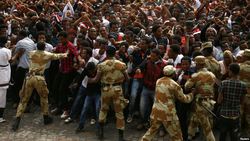ASO | 9 October 2016
Ethiopia: At least 700 feared dead at Irrecha religious festival
Ethiopia: At least 700 feared dead at Irrecha religious festival
Anywaa Survival Organisation-ASO strongly condemns the Ethiopian government security agents’ provocation at Irrecha religious festival at Bishoftu, 45km from the capital, Addis Ababa. ASO is further greatly concerned about the worsening security situation and the fear it causes to civilians. Since the violent incident on Sunday that claimed precious lives, the government deployed heavy police and special security agents on the streets of the capital and the surroundings. Banks, schools, public transport and shops have largely been affected with families stocking up food for uncertainties.
The religious festival turned bloody when the government police forces fired teargas, fired bullets and flew helicopters over the crowds leading to panic and chaos. More than 700 lives were lost at the religious festival and the death toll could rise as many remain unaccounted for and some are in critical condition in hospitals. The government downplayed the death toll and showed symbolic gesture by declaring three days mourning and lowering of the flag for the loss of lives at the festival. The anti-government protest in response to the government miscalculation and mishandling of the Oromo religious festival has spread to other towns including Ambo and some parts of the capital. On Tuesday 4 October 2016 an angry mob set on fire a bus heading from the capital to Addis Alem, outside of Addis Ababa.
The Oromo, Ethiopia’s largest ethnic group, gathers annually to thank their God for blessings and mercies. The protestors rejected the government effort to turn the religious festival into a political rally to appeal to about 2 million people at the festival. The regime has been deploying violent tactics to silence its critics and peaceful protestors. The government action to disperse the crowds that were rejecting the government’s political message is what led to the stampede and death of innocent people at the Irrecha festival.
It is to be recalled that at the end of 2015, the government plan to incorporate farmlands surrounding the capital, Addis Ababa, sparked violent conflict with the security agents killing more than 500 peaceful protestors, mostly students and small-scale farmers. The plan would further marginalise and displace local farmers and deprive and deny them access to farmlands.
The conflict on Sunday, October 2, 2016 resonates the suffering of the Ethiopian people have endured under the TPLF regime over the past 25 years. The regime continues to deploy violent tactics to intimidate, murder, rape, arbitrarily detain and arrest its critics and peaceful protestors. The government has been rounding up indiscriminately ethnic Amhara and Oromo people, the two largest ethnic groups in the country.
The Konso ethnic group’s demand for administrative status was also met with violent repression, arbitrary arrest and detention of community leaders, with security agents firing live bullets at peaceful protestors. In 2003, the Ethiopian army targeted Anywaa (or Anuak) indigenous people and indiscriminately arrested, detained, raped, and murdered them, as well as destroying their properties and displacing them from their homes and lands. The Anywaa (or Anuak) homelands in the Gambela region have been a major target of the government’s land policy over he past decade, which makes large areas of lands available to foreign and domestic investors to produce crops for export purposes.
Ethiopia is a key ally in the western governments’ war on terror and the largest recipient of food aid and financial support on the African continent, which it requires to deal with chronic food insecurity, famine and drought. Yet, the government’s widespread human rights abuses and its criminalisation of food security, land and human rights defenders, journalists and political opponents receives far less attention from these financial backers, and this worsens the security and human rights situation in a country of about 95 million people. Three food security, land and human rights defenders; Pastor Omot Agwa, Ashinie Astin and Jemal Oumar, have remained behind bars for more than 16 months, being criminalised for their attempts to attend a food security and land rights workshop in Nairobi, Kenya.
ASO calls upon the UN and international community to immediately dispatch an independent investigation team and observers to investigate and monitor the human rights and security situation in the country and its most troubled regions including South Omo and other SNNPR territories.














